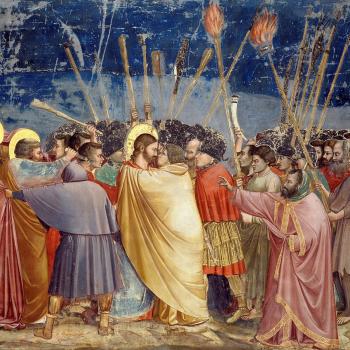Many critics of Christianity portray it as a religion merely of other-worldly transcendence. But as even a cursory glance at the work of thinkers like Thomas Aquinas, Duns Scotus, Nicholas of Cusa, or many other thinkers would show, such critics argue against a straw person and feel proud of themselves when that person burns easily.
Unfortunately, though, the critics' naïve understanding of Christianity is one that Christians themselves have not always avoided and have sometimes encouraged. Think of the many 19th- and early 20th-century hymns and folk songs that long for eternity as an escape from this world.
The hymn "In the Sweet By and By" (1868), for example, bids us live in hope of "a dwelling place" in "a land that is fairer than day" and that we can only see from afar. As sweet as much of this music is, it urges on us a world-denying Christianity. It embodies a view that Nietzsche would describe as self-loathing and that merits Joe Hill's parody:
Long-haired preachers come out every night,
Try to tell you what's wrong and what's right;
But when asked how 'bout something to eat
They will answer in voices so sweet
You will eat, by and by,
In that glorious land above the sky;
Work and pray, live on hay,
You'll get pie in the sky when you die.
Whatever Jesus' actual message or the content of actual Christian theologies, as Nietzsche and Hill note, Christians have sometimes understood their religion to offer them merely a kingdom beyond this world: "a ladder to heaven" in Nietzsche's terms; "pie in the sky when you die" for Joe Hill.
The kind of Christianity that can be inferred from those kinds of hymns and sermons offers our critics an easy target for criticism, whether naïve or sophisticated. But such targets are not genuinely Christian ones.
Without the Incarnation, Christianity might be a teaching in this world for how to obtain a reward in another world. But as we often fail to remember, with the Incarnation Christianity is explicitly a teaching about and for this world. The paradox of the God-man is the paradox of transcendence in rather than beyond immanence.
The earliest Christian Council (Nicaea, 325) was called, among other reasons, to combat the Gnostic heresy that Christianity is really about some other world rather than this one. The Council was called to make it clear that Jesus was fully human and fully divine rather than "an artful dodger into invisible immanence," to quote Ernst Bloch (Atheism in Christianity: The Religion of the Exodus and the Kingdom, 115).
Those whom we now loosely gather under the name "Gnostics" separated God's kingdom from human temporal existence, conflating the latter with the order of alienation from God. At first glance that sounds similar to Christianity: this is a fallen world in which we find ourselves, at least at first, alienated from God. But Gnostics believed that one cannot overcome the alienation in this world except through asceticism and knowing (gnōsis), which could save the soul but not the irredeemable body. The body, after all, was merely one of the traps of this world and, therefore, something to escape.
Gnostics insisted that the place and order of human existence is the creation of the lowest class of the 365 angelic powers, not the work of the Father. According to them, that angelic power is the God of Judaism, called the demiurge, and is antagonistic to the Father. To rescue us from the demiurge and the world in which he has entrapped us, the Father sent his "Christ-Nous" to appear through Jesus of Nazareth.
But, Gnostics claimed that since this Christ-Nous is God he was not and could not have been incarnate. So he also could not have been crucified. Instead, they said, Simon of Cyrene (Mt. 27:32) was crucified in his place. It was against this Gnostic view that the Council of Nicaea argued for Jesus' transcendence in immanence. They insisted that he was both fully human and fully divine.
That idea was not an invention of the Council of Nicaea. Nor was it a belief inferred from philosophical reflection on other beliefs. The Council argued for an already-existing Christian belief. Indeed, the Gospels appear to have been written at least partly to testify of Jesus' dual nature, and 1 John may have been written to counter Gnostic ideas. Christianity has preached transcendence in immanence from the beginning.
But what about scriptures that seem to teach explicitly that Jesus comes to us from an other-worldly, transcendent realm? Among the most obvious are John 8:23 and John 18:36. The first says "I am from above . . . I am not of this world." The second says, "My kingdom is not of this world." It is not difficult to see these as proof-texts for a belief in the wholly transcendent realm of God.





